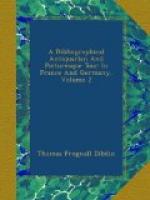To my whimsically formed taste, OLD PARIS has in it very much to delight, and afford valuable information. Not that I would decry the absolute splendor, gaiety, comfort, and interminable variety, which prevail in its more modern and fashionable quarters. And certainly one may fairly say, that, on either side the Seine, Paris is a city in which an Englishman,— who is resolved to be in good humour with all about him, and to shew that civility to others which he is sure to receive from the better educated classes of society here—cannot fail to find himself pleased, perfectly at ease, and well contented with his fare. Compared with the older part of London, the more ancient division of Paris is infinitely more interesting, and of a finer architectural construction. The conical roofs every now and then remind you of the times of Francis I.; and the clustered arabesques, upon pilasters, or running between the bolder projections of the facades, confirm you in the chronology of the buildings. But time, caprice, fashion, or poverty, will, in less than half a century, materially change both the substance and surfaces of things. It is here, as at Rouen—you bewail the work of destruction which has oftentimes converted cloisters into workshops, and consecrated edifices into warehouses of every description. Human nature and the fate of human works are every where the same. Let two more centuries revolve, and the THUILERIES and the LOUVRE may possibly be as the BASTILLE and the TEMPLE.
Such, to my feelings, is Paris—considered only with reference to its local: for I have really done little more than perambulate its streets, and survey its house-tops—with the important exceptions to be detailed in the succeeding letters from hence. Of the treasures contained beneath some of those “housetops”—more especially of such as are found in the shape of a BOOK—whether as a MS. or a Printed Volume—prepare to receive some particulars in my next.
[1] [Several Notes in this volume having reference
to MONS. CRAPELET, a
Printer of very considerable
eminence at Paris, it may be proper to
inform the Reader that that
portion of this Tour, which may be said to
have a more exclusive reference
to France, usually speaking—including




